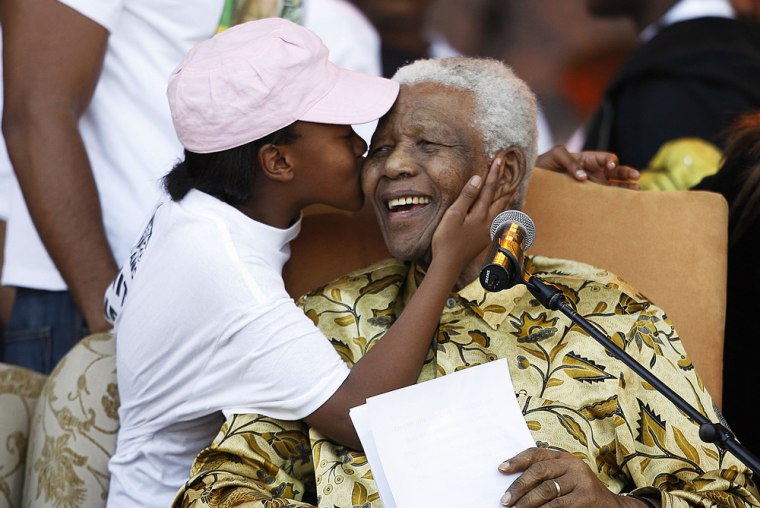Within 24 hours of Nelson Mandela’s release from his 27 years in prison in 1990, I was on a plane bound for South Africa filled with confidence and apprehension. I needed the confidence to make my way through the legions of journalists now descending on Johannesburg in hopes of getting an interview with this man who by now had achieved iconic status, but I was apprehensive my confidence might not be enough.
Since I first went to South Africa in 1985, I had kept in touch with Mandela’s representatives in the African National Congress in exile and hoped those connections would now help me get the most sought after interview at that time, in the world.
My first stop was Soweto, one of the many townships in South Africa the oppressive white apartheid regime had confined blacks to. Here was the tiny three-room house that Nelson Mandela called home; although he had hardly lived there, especially after he went underground in early 1961, in his words, “to live as an outlaw in my own land.”
Captured and arrested in 1962, Mandela was kept locked up and completely hidden from public view for almost three decades. He spent most of his prison time in the spartan, brutal isolation of Robben Island, where every day he could see, but not touch, his beloved country across the water.
I was elated, almost beyond words, when a few days after Mandela walked free, I found myself sitting in front of him. We conducted the interview in the yard of the Soweto home he rarely got to sleep in even before he went to prison. He was too busy helping his party, the ANC, press, agitate and eventually take up arms in their struggle for full equality “for all” who lived in South Africa, as the 1955 Freedom Charter proclaimed.
After all those years in prison, Mandela, though relaxed, was not accustomed to television, in general, and a probing media, in particular.
The one flash of prison life he allowed himself to share with me came not in the interview, but during the time my crew was putting microphones on us and setting up the shot. I was making small talk and told him I was from the United States, where our Civil Rights Movement shared so many goals and objectives with the struggle against apartheid. And before I could finish my sentence, he interrupted me.
“Do you know Miss Maya Angelou?” he asked.
And when I said I did, he went on to say that he and other political prisoners had helped pass their time reading her books and that he admired her. With the world waiting to hear what was on Mandela’s mind, I couldn’t wait to get back to the United States and tell Angelou that her work had helped Mandela and his fellow prisoners bear the burden of those long years on Robben Island.
Over the ensuing years, as Mandela took his rightful place as the leader of a newly democratic South Africa, I followed his pursuit of his dream of a rainbow nation, one not yet realized even more than 20 years later. But thanks to Mandela’s insistence on forgiveness and reconciliation, overt racial conflict was avoided and a black-led government was able to come to power and govern in relative peace.
There were times that I got up close to Mandela. He was always accessible, much to the dismay of his main press handler. But whenever I saw him, he was always open: At public events or speaking engagements, during his first trip to the United States when I interviewed him at the Council on Foreign Relations, and back in South Africa when he voted for just the second time in his life. And after his five-year term ended, when he was still functioning as the “father of the nation,” serving as a peacemaker in countries like Burundi and Rwanda, and organizing a group of elder statesmen to address human rights and promote peace.
When few public figures were talking about HIV/AIDS openly, Mandela took on the disease which was threatening his rainbow nation as much as the continuing racial and economic divide.
I was there at the church when Mandela and his family mourned the death of his son – an AIDS victim –and also when he went public about it. Whenever he had a platform, Mandela would tell his fellow South Africans they must defeat the stigma of HIV/AIDS, as well as the disease itself.
And he seemed to be trying to make up for the time he lost during those decades in prison by embracing not only his now adult children, his grandchildren and his wife Graca Machel's children, but also the children of South Africa and the world.
In 2004, at age 85, Mandela announced his “retirement from retirement,” saying: “Don’t call me. I will call you.”
Despite his “retirement from retirement,” he continued to be sought after by visiting dignitaries, and other important, and not so important, visitors to the country.
As the years wore on, I saw Mandela grow increasingly more relaxed with the media, opening wider a window into his prison life and other aspects of his “long walk to freedom,” including his two failed marriages. And no-one wanted to miss a Mandela press conference, no matter the subject.
But nothing fundamentally changed about the man I first met in his backyard a few days after he was released from prison. He was always gracious and charming, and once he had seen you enough times, sometimes the jokester.
After voting in local elections in Johannesburg in 2011, as he was slowly exiting the room, his gait a bit more labored now, he looked over to where I was standing. He smiled as he walked past me and called out: “Are you on pension yet?”
Charlayne Hunter-Gault is an NBC News Special Correspondent. An award winning journalist, she has covered South Africa since the 1980s.
Related:
